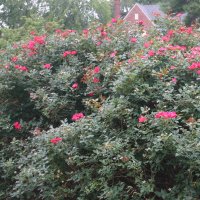Edmund Burke must have had a bit of the gardener about him. The author, orator, political theorist and philosopher once said, “Nobody made a greater mistake than he who did nothing because he could do only a little.” Burke’s observation frequently crosses my mind when I can spare only a few minutes for weeding or dead-heading my flowers.

Ben Franklin made the same point with his aphorism about lost nails and lost wars. It’s astonishingly easy to underestimate what one might achieve in the garden with just a bit of effort hitched to the powerful engine of photosynthesis—or unhitched, in the case of little weeds plucked before they really get cranking.
Those who’ve wandered up Griffing Boulevard in north Asheville (just off Kimberly Avenue a bit north of the Grove Park Inn golf course) have seen firsthand what one neighborhood’s small efforts can become. In the 1920s there was a grassy median strip on Griffing where cavalry had sometimes practiced. The city decided to turn the space into a rose garden, and by some accounts it was gardeners from Biltmore Estate who created the original design. In the tradition of formal rose gardens, the strip was planted with hybrid tea varieties; to this day, it remains the city’s only rose garden.
By the 1970s, however, city coffers were bare, and it was decided to let the roses revert to sod. But Griffing resident Mary Bruce Woody was having none of it, and she rallied her neighbors.
“We had all bought houses on the garden,” she recalls. “So we got together with Parks & Rec and Susan Roderick [of Quality Forward] and found a way to preserve it.” Though Woody downplays her role, for nearly two decades she chaired the neighborhood group that formed to save the garden.
Under her leadership, residents negotiated with the city, which resumed mowing and providing mulch and water. Meanwhile neighbors pitched in to refurbish beds, purchase new plants, weed, prune and move the whole scheme beyond its former glory. “The Men’s Garden Club helped out, but they chose more hybrid tea roses that had to be sprayed every week.” (Hybrid teas are notoriously prone to black spot and other rose maladies.) Under Woody’s regime, however, that gradually changed. “Now the roses there are hardier,” she says. “They don’t have to be sprayed. They may look a little messier, but it is a lot better for the environment.”
Thirty years on, the glorious garden endures, still tended by neighbors (aided by a hired gardener—“a woman from Biltmore Estate,” according to Roderick). Quality Forward, involved in the neighborhood effort from the start, maintains a dedicated fund for the Griffing Boulevard project. “When we get low on money, we let the neighbors know and everyone pitches in what they can,” says Roderick. “One woman contributes $1,000 every year. The project really captures what Quality Forward is about,” she continues. “Neighborhoods and government and our group working together to create a beautiful city.”
Despite this year’s late freeze and devastating drought—compounding the annual onslaught of Japanese beetles—the blooms persist. There are fewer than in the past, but they’re every bit as fragrant. Even the varietal names are alluring: Johann Strauss, Traviata, Frederic Mistral, The McCartney, Fair Bianca, Belinda’s Dream, Hawkeye Belle, Carefree Delight, Winter Sunset and (patiently awaiting the upcoming Mountain Dance and Folk Festival), Country Dancer. Many types of propagated roses are represented here, including a couple of the old standby hybrid teas as well as hybrid musk, shrub and buck shrub, hybrid rugosa and the irresistable romantica. As noted in Kent Priestley’s recent garden column (“Some Like It Hot,” July 25 Xpress), the rugosa-type roses are particularly well suited to an era in which climate change may bring greater variation in temperatures and rainfall.
Today, neighbors from several blocks away gravitate to the garden during evening walks, and cyclists headed up or down the back routes to Town Mountain often pause for a look and a sniff.
Burke would doubtless be pleased. Many hands have done their little, a few have done a lot, and the result is something splendid for all.



Before you comment
The comments section is here to provide a platform for civil dialogue on the issues we face together as a local community. Xpress is committed to offering this platform for all voices, but when the tone of the discussion gets nasty or strays off topic, we believe many people choose not to participate. Xpress editors are determined to moderate comments to ensure a constructive interchange is maintained. All comments judged not to be in keeping with the spirit of civil discourse will be removed and repeat violators will be banned. See here for our terms of service. Thank you for being part of this effort to promote respectful discussion.